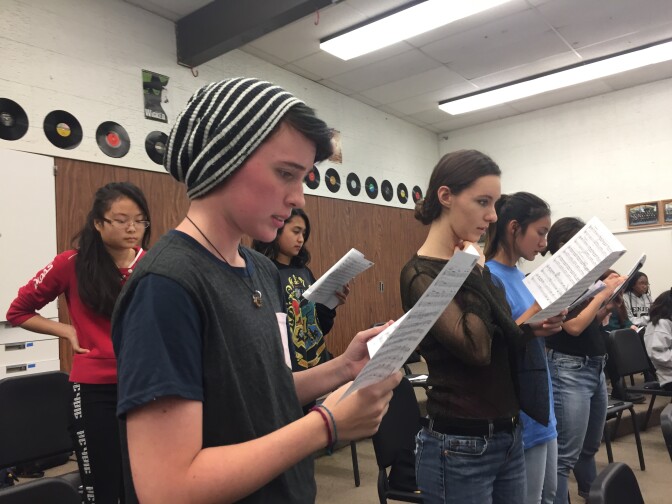This story is free to read because readers choose to support LAist. If you find value in independent local reporting, make a donation to power our newsroom today.
This archival content was originally written for and published on KPCC.org. Keep in mind that links and images may no longer work — and references may be outdated.
In this choir, every gender has a voice
For high school students who may be shy or might not feel like they fit in, the choir room can serve as a safe haven.
But at Canyon High School, director of vocal music Ariel May is taking a step further: she wants to make it clear that her room is a safe space for everyone. She keeps her doors open at lunch, so students can come in and out as they please. In one corner, there's a set of bean bags for students to lounge on; in another, there's a tea station to help soothe their voices.
And across all the turquoise walls, there are signs that say "SAFE SPACE" in big, bold – and on some of the signs, rainbow-colored – letters. May makes a point of explaining what that means to her students at the beginning of each semester.
"I think it's pretty normal for us to go over [what safe spaces mean] in terms of religious beliefs and race – and oftentimes we don't add to that sexual orientation or gender identity, and so I've made it a point to make sure those are listed," May said.

One of her current students, 11th grader Percy Ragsdale, said those changes have made their experience in choir different than any other.
"I grew up in Texas and I was in choirs there from when I was three, and it was always very binary," Percy explained. "Like if you were a soprano or alto, you were in dresses and makeup and all of that."
That would make Percy uncomfortable, because Percy identifies as transmasculine.
"So I mostly identify as a guy, but sometimes I'm more in the in between zone," Percy explained. "I'm comfortable with wearing a skirt sometimes, and sometimes I'm not."
While the choirs in Texas may have felt very gendered to Percy, May is trying her best to make her choirs gender inclusive. For example, she asks students which pronouns students would like her to use when she's talking about them. Percy prefers "they" and "them" pronouns.

May also changed the names of her choirs. While some schools opt for titles like the "Women's Choir" or "Men's Choir," May calls her choirs by what musical clef their voice parts are written in. Sopranos and altos singing together are called Treble Clef Choir; basses and tenors are called Bass Clef Choir.
The teacher even incorporated student input and switched up the choir's performance attire. In many choirs, female singers are asked to wear dresses, and male singers wear tuxedos. May, however, offers a third option: a tailored suit jacket.
https://www.youtube.com/watch?v=uXyvTXw4g4g
These changes may seem small, even bureaucratic. But Percy says they have made a big difference.
"It's really nice not having to think, 'Oh, I wonder if I look weird in this dress,' or 'Uh, I don't like having makeup on my face,' or 'I feel awkward and stuck,'" Percy said. "It's so much easier to let loose and sing."
Dr. Josh Palkki studies music education and the LGBT community at California State University, Long Beach.
He's noticed that over the past few years, choral teachers have been discussing how to best teach trans students on social media.
"I would classify 80 percent of the responses as generally really supportive and beautiful and lovely, and the other 20 percent are, to be blunt, quite terrifying," Palkki said.
That's why Palkki also travels to conferences and presents best practices for supporting LGBT youth through music education. May, for example, saw one of his presentations in 2015, and incorporated many of his suggestions into her classes at Canyon High School.
"Music programs, in general, in schools, and ... choir programs, have always been considered safe spaces for anyone who is different," Palkki explained. "Especially for LGBTQ students."
Percy said they see the choir room as a second home. They eat lunch there, and hang out there with their friends.
"I've never been this confident in myself, in my singing, in who I am as a person," Percy said. "I've never had such a close bond with so many people."
For May, seeing the choir community grow and take care of each other gives her hope for the future.
"Students will say, 'The real world isn't like choir. Everyone's way nicer here, and everyone's so accepting here,' and I tell them, 'Your job is to create that outside,'" May said.
Percy, for example, wants to be an English teacher and incorporate what they learned from May into their own classroom.
"It's great to see what I can do as a teacher when I'm older that can help my students and help them feel more comfortable," Percy said. "Because high school sucks, so if you can be more comfortable in it, why not?"
In the meantime, Percy has advice for students struggling with their gender identity.
"Don't think that you have to just lock yourself up and be a certain way because of school, or because of whatever reason," Percy said. "Be yourself."
As for teachers, Percy encourages them to at least try to make their classrooms more inclusive.
"For your students that might be confused right now, or might be different than what you think they are, it means a mile for us," they said.








